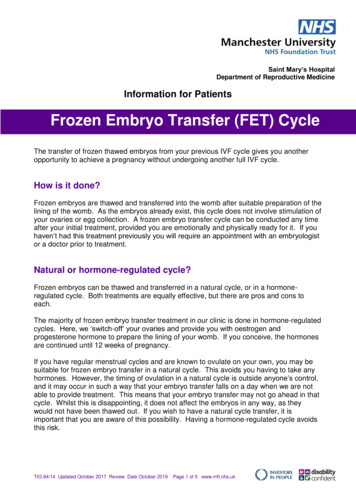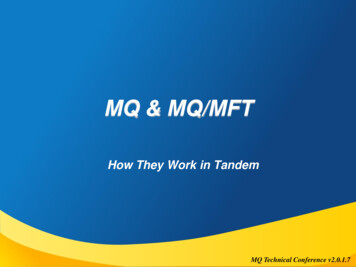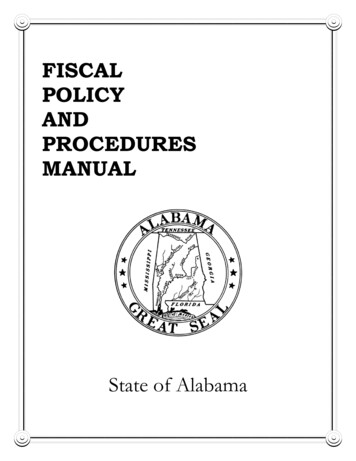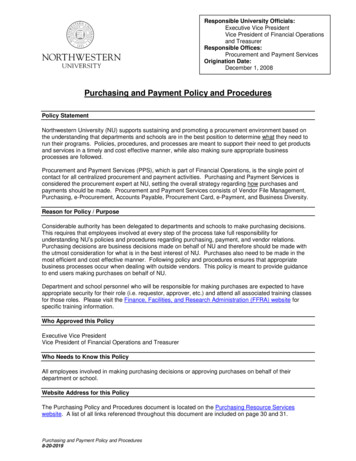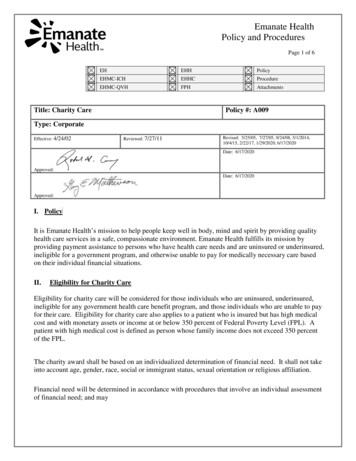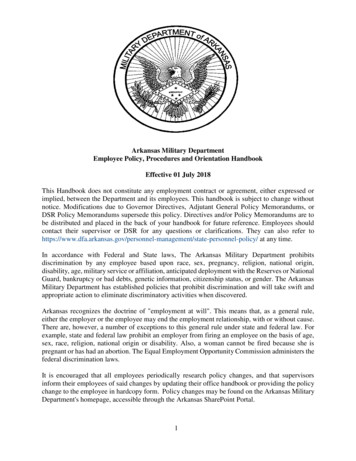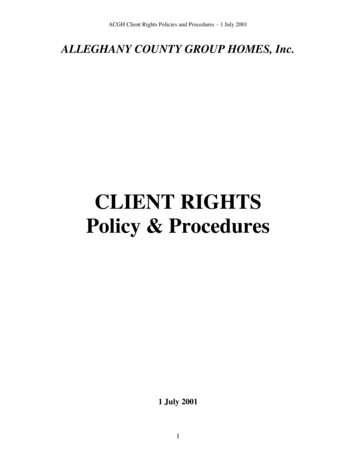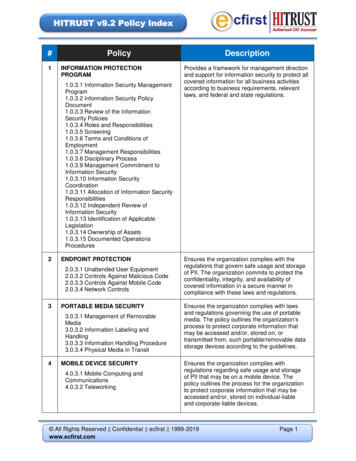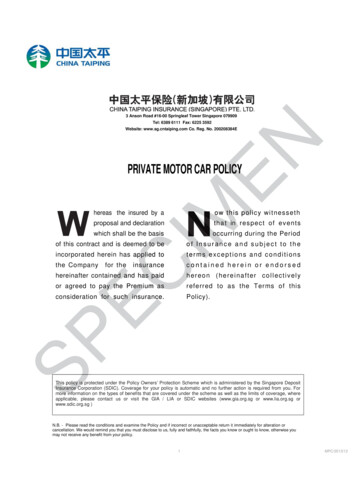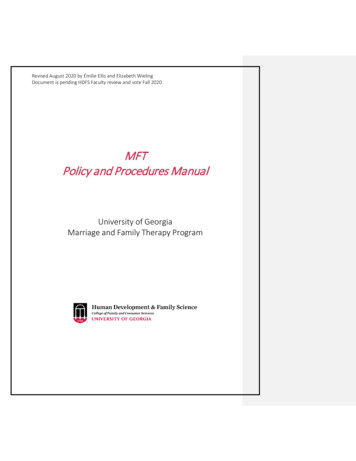
Transcription
Revised August 2020 by Émilie Ellis and Elizabeth WielingDocument is pending HDFS Faculty review and vote Fall 2020MFTPolicy and Procedures ManualUniversity of GeorgiaMarriage and Family Therapy Program
2Table of ContentsMission Statements . 5University of Georgia Mission Statement .5UGA MFT Doctoral Program Mission Statement .6MFT Program Identity . 6Diversity Statement . 7Faculty . 8Faculty Outcomes.9Major Professor and Advising Committee . 10Initial Advisor .10Choosing a Major Professor and Advisory Committee .10MFT Educational Outcomes . 11Program Goals and Student Learning Outcomes Matrix .15Curriculum Requirements . 17Comprehensive Exams . 18Portfolio Requirements . 19Clinical Experience Requirements . 23Liability Insurance .23Verification of Hours Obtained Prior to UGA.23Practicum .23Requirements for Practicum . 24Practicum Evaluations . 25Exiting Practicum . 25Supervision .25Demonstrating Clinical Competence.26Path A . 26Path B . 26Path C . 27Paths to demonstrating clinical competency . 28Amendment to Clinical Experience Requirements During COVID-19 .28Applying Hours Towards Licensure .29Portability of Degree . 29Clinical Supervisor Equivalency Requirements .29Supervision Training .30Requirements for the Supervision Course (HDFS 9080) . 30Students Pursuing AAMFT Approved Supervisor Status . 30
3Theory of Therapy Papers and Final Presentation . 31Schedule for Theory of Therapy Papers & Presentation .31Criteria .31Review and Feedback Process .32Clinical Presentations .33Internship Requirements . 34Internship Evaluation .35Dissertation . 36Annual MFT Student Evaluations. 36MFT Program Climate . 36Diversity .37Student Self Care . 38Presentations in Community Settings . 38Grievance Policy . 38Program Exit Interview . 41Additional Policies Relevant to MFT Students. 41Appendix A – MFT Student Semester Self-Report . 43Appendix B – MFT Program Student Requirement Checklist . 45Appendix C – MFT Program Meeting Schedules . 46Appendix D – Job Descriptions . 47Program Director .47Internship (Coordinated by Dr. Liz Wieling, Program Director with HDFS staff support) .48Responsibilities and Requirements of all Tenured Line MFT Faculty .48Appendix E – MFT License Requirements in Georgia . 50Appendix F – Licensure Requirements by State . 54Appendix Ga – Clinical Evaluation Form (Student Self-Evaluation). 62Appendix Gb –Clinical Evaluation Form (Supervisor) . 67Appendix H – Clinical Supervisor Evaluation Form . 72Appendix I – Theory of Therapy Writing Rubric . 74Appendix J – Theory of Therapy Oral Presentation Rubric . 76Appendix K – AAMFT Code of Ethics . 78Appendix L – ASPIRE Clinic Hours Sheets . 92
4Appendix M – Electronic Hours Sheets During COVID-19 . 98Appendix N – Program Exit Interview . 99Appendix O – Annual MFT Student Evaluations . 101Appendix P – Curriculum for MFT Students* . 102Appendix Q – Program Director Evaluation . 105Appendix R – MFT Portfolio Evaluation Rubric . 106Appendix S - ASPIRE Client Satisfaction Survey . 111Appendix T – Student Support Services Survey . 113Appendix U – MFT Program Assessment Schedule . 114Appendix V – Internship Plan Proposal . 117Appendix W – Internship Report Form. 118
5University of GeorgiaMarriage and Family Therapy ProgramPolicy and Procedures ManualWelcome to the Marriage and Family Therapy (MFT) Program at the University of Georgia. TheMFT program is housed within the College of Family and Consumer Science and the Departmentof Human Development and Family Science. The MFT program is accredited by the Commissionon Accreditation for Marriage and Family Therapy (COAMFTE) and The InternationalAccreditation Commission for Systemic Therapy Education (IACSTE).This manual will cover information unique to the MFT Program and was developed in order topromote transparency and accuracy about policies, procedures, and program expectations. Itshould be used in concordance with the HDFS Doctoral Program for MFT Emphasis Handbookand the ASPIRE Clinic Manual. It is necessary to meet the guidelines of all three documents.The HDFS Doctoral Handbook:https://www.fcs.uga.edu/docs/HDFS Doctoral Handbook 2019 MFT from COAMFTE Masters.pdfThe ASPIRE Clinic PSgWqEw1NfOCRrQoP73pyGYtjdR8duJqlgiA/edit?usp sharingEvery effort is made to provide accurate and current information in this handbook, the MFTprogram reserves the right to change statements in the handbook concerning polices, curricula,or other matters. Students enrolled in the MFT Program agree to comply with the Program’s rulesand regulations and to accommodate to changes when necessary (i.e., transition to COAMFTEversion 12 guidelines).Mission StatementsUniversity of Georgia Mission StatementThe University of Georgia shares with the other research universities of the University System ofGeorgia the following core characteristics: a statewide responsibility and commitment to excellence and academic achievementshaving national and international recognition; a commitment to excellence in a teaching/learning environment dedicated to serving adiverse and well-prepared student body, to promoting high levels of studentachievement, and to providing appropriate academic support services; a commitment to excellence in research, scholarship, and creative endeavors that arefocused on organized programs to create, maintain, and apply new knowledge andtheories; that promote instructional quality and effectiveness; and that enhanceinstitutionally relevant faculty qualifications; a commitment to excellence in public service, economic development, and technicalassistance activities designed to address the strategic needs of the state of Georgia along
6 with a comprehensive offering of continuing education designed to meet the needs ofGeorgia’s citizens in life-long learning and professional education;a wide range of academic and professional programming at the baccalaureate, master’s,and doctoral levels.UGA MFT Doctoral Program Mission StatementThe mission of the Marriage and Family Therapy (MFT) Program at the University of Georgia is totrain scientist-practitioners to become innovative leaders in addressing contemporary challengesin global mental health. Faculty and students will engage in scholarship that advances solutionsto complex issues affecting diverse individuals, families and communities using a systemicrelational orientation. Scholars will demonstrate excellence in teaching, clinical research andengagement focused on promoting a social justice agenda.MFT Program IdentityWorking relationally and systemically with diverse individuals, couples, families and communities:Global Mental HealthTranslational Sciences- Cultural Responsiveness- Social Determinants of HealthTraumatic Stress &ResilienceImmigrant and RefugeeFamiliesThe above graphic is a representation of the dynamic interaction between our values and areasof scholarship. As a program we strive towards relational scholarship – research, clinical work,teaching, and community outreach – that centers and/or benefits diverse individuals, couples,families, and communities. This manifests around four central topics: global mental health,traumatic stress & resilience, immigrant & refugee families, and translational sciences withparticular attention to cultural responsiveness and an emphasis on social determinants of health.These four topics are reflected in most, but not all of our work. They are dynamic in and ofthemselves and interact with broader topics within the field of Human Development and FamilyScience.Commented [EME1]: Added to incorporate Jerry’sfeedback
7Diversity StatementWe acknowledge that the land on which the University of Georgia stands is the traditionalterritory of the Muscogee-Creek, Cherokee, and Chickasaw Peoples, and was founded andmaintained by enslaved people in the antebellum period. We acknowledge these people andtheir ancestors with respect, and recognize that, today, we continue to benefit from this legacyof oppression.The University of Georgia’s doctoral marriage and family therapy program is committed tostriving toward affirming the lives and identities of individuals, couples, families andcommunities of marginalized identities through our scholarship, which includes research, clinicalpractice, teaching and community outreach. In particular, we strive towards the inclusion andaffirmation of people marginalized and oppressed on the basis of race, ethnicity, gender identityand expression, sexual orientation, socioeconomic position, ability status, immigration andcitizenship status, religion, and age. This work includes striving toward centering marginalizedgroups in our scholarship, doing work that benefits them, as well as supporting the growth anddevelopment of students of marginalized identities. We strive to accomplish this by engaging inongoing self-examination, deploying decolonizing practices, and promoting the liberation ofhistorically and currently disenfranchised populations.Although inclusion and affirmation are key in supporting diversity and equity in the field ofmarriage and family therapy, we are also committed to striving towards dismantling thosesystems of oppression that continue to marginalize and oppress. This includes not onlyacknowledging the ways in which we benefit from and are complicit in maintaining thesesystems, but also taking direct actions to deconstruct White supremacy, cissexism, ableism,sexism, classism, heterosexism, xenophobia, and their intersections in our scholarship, and in ourown department and academic community.We believe this work is never done; we believe we can never be done. We are thereforecommitted to listening to marginalized and oppressed groups and raising their voices. Weendeavor to hold each other accountable, students and faculty alike, aspiring to create a spacethat is safer for all, that inspires sustainable socially-just scholarship, and that inspires the growthand development of social justice leaders in the field of marriage and family therapy.[Émilie Ellis and Elizabeth Wieling, August 2020]
8FacultyAll MFT faculty are doctoral-level Marriage and Family Therapists and AAMFT ApprovedSupervisors. Please refer to the UGA HDFS website for faculty curriculum vitas and currentresearch projects. https://www.fcs.uga.edu/hdfs/graduate-facultyDr. Elizabeth WielingPh.D. Human Development & Family Studies/MFT, Iowa State University, 1997MFT Program DirectorProfessorEvidenced based treatments for families affected by traumatic stressEvidence based parenting interventions/Child mental healthImmigrant and refugee mental healthGlobal mental healthTranslational Sciences - prevention, implementation, and disseminationDr. J. Maria BermúdezPh.D. Human Development & Family Science/MFT, Virginia Tech, 2002Associate ProfessorLatino family resilienceIntersections of race, class, gender, and sexuality among Latinx populationsNarrative family therapyFeminist informed therapy and researchDr. Jerry GalePh.D. Marriage and Family Therapy, Texas Tech University, 1989ProfessorMeditation as a relational practice for personal and social justiceFinancial therapyInterdisciplinary approaches to treating financial and relational stressAttachment in families with adopted childrenDr. Desiree Seponski.Ph.D. Child & Family Development/MFT, University of Georgia, 2011Associate ProfessorCulturally responsive family therapy and interventionCambodian and Southeast Asian immigrant and refugee families affected by poverty, trauma,and discriminationDr. Jennifer GonyeaClinical Associate ProfessorPh.D. Child & Family Development/MFT, University of Georgia, 2005Family functioning & couple interactions
9Strengthening couple relationshipsImproving mental health and overall wellnessTraining C/MFT service providersEvaluation research on community-based interventionsFaculty OutcomesIn order to obtain our program goals (see MFT Educational Outcomes), our faculty are held to aspecific standard in terms of research, teaching, clinical work, and social justice. All MFT facultym
Sep 09, 2020 · The University of Georgia’s doctoral marriage and family therapy program is committed to striving toward affirmi ng the lives and identities of individuals, couples, families and communities of marginalized identities through our scholarship, which includes rese
